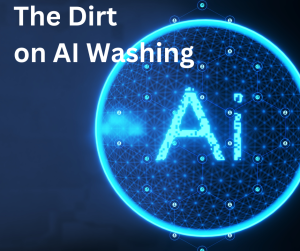Many people have become familiar with the term “greenwashing,” referring to attempts by a company to cast its products as more environmentally friendly than they are through public relations and marketing “spin” efforts.
Now comes the concept of “AI-washing,” in which companies exaggerate the degree to which or ways in which their products and services are powered by artificial intelligence, in order to gain a real or perceived competitive advantage. In addition to potentially misleading consumers and harming investors, this can break U.S. securities law, according to Gary Gensler, chair of the Securities and Exchange Commission.
SEC Enforcement Actions
Indeed, the SEC has charged and subsequently settled in March with two investment advisers,
and Global Predictions Inc., based on allegations that they made false and misleading statements about their use of AI. Delphia paid $225,000 and Global Predictions $175,000, without admitting or denying the SEC’s findings.
The SEC claimed that Toronto-based Delphia made these statements from 2019 to 2023 in SEC filings, a press release and on its website—for example, the order that the company violated the Advisers Act alleged that Delphia falsely claimed its “put collective data to work to make our artificial intelligence smarter so it can predict which companies and trends are about to make it big an invest in them before anyone else.”
The SEC alleged that San Francisco-based Global Predictions did the same on its website and social media, falsely claiming, for example to be the “first regulated AI financial advisor” and that it provided “[e]xpert AI-driven forecasts.”
How to Avoid AI Spin
Given the broad reach and somewhat elastic definition of artificial intelligence, companies might be tempted to push the bounds of that definition to exploit its popularity. While there has been much talk in the news about generative AI such as ChatGPT, a somewhat more advanced form that can respond to queries in detailed and sometimes accurate ways, not all artificial intelligence fits that category.
The Federal Trade Commission has published a few basic queries a business should ask itself to ensure that it’s not crossing the line from reasonable promotion into AI-washing. A company needs scientific proof, for example, of any claims about what AI can do in terms of performance, to guard against accusations of exaggeration. There also needs to be proof that an AI product does something beyond what its previous non-AI counterpart had done, especially if a company is raising prices or making labor-related decisions as a result. And a business can’t claim a product is “AI-powered” because it used an AI tool during development.
Why It Happens
Businesses can get drawn into “AI washing” for a number of reasons. In some cases, they expect to include AI in a product but advertise it as such beforehand and don’t actually end up using it. In other cases, they don’t necessarily understand the definition and exaggerate what they’re offering in their own mind. Lastly, they see such claims as an opportunity to boost their potential valuation and attract investors, similar to the “dot-com bubble” days.
To avoid such happenstances, businesses should ask for hard evidence of how AI will be used in a product, involve their information technology team in developing or purchasing products to ensure full understanding, make sure to suss out the full scope of a product’s pros and cons—don’t buy just because of the AI claims—and keep up with industry news to learn what’s worked and what hasn’t for other businesses.
New technologies require every business review its business practices to comply with the new regulations promulagated for the new technologies. The increased use of AI in every business requires a new approach to how it is used in your business.
 Chicago Business Attorney Blog
Chicago Business Attorney Blog


